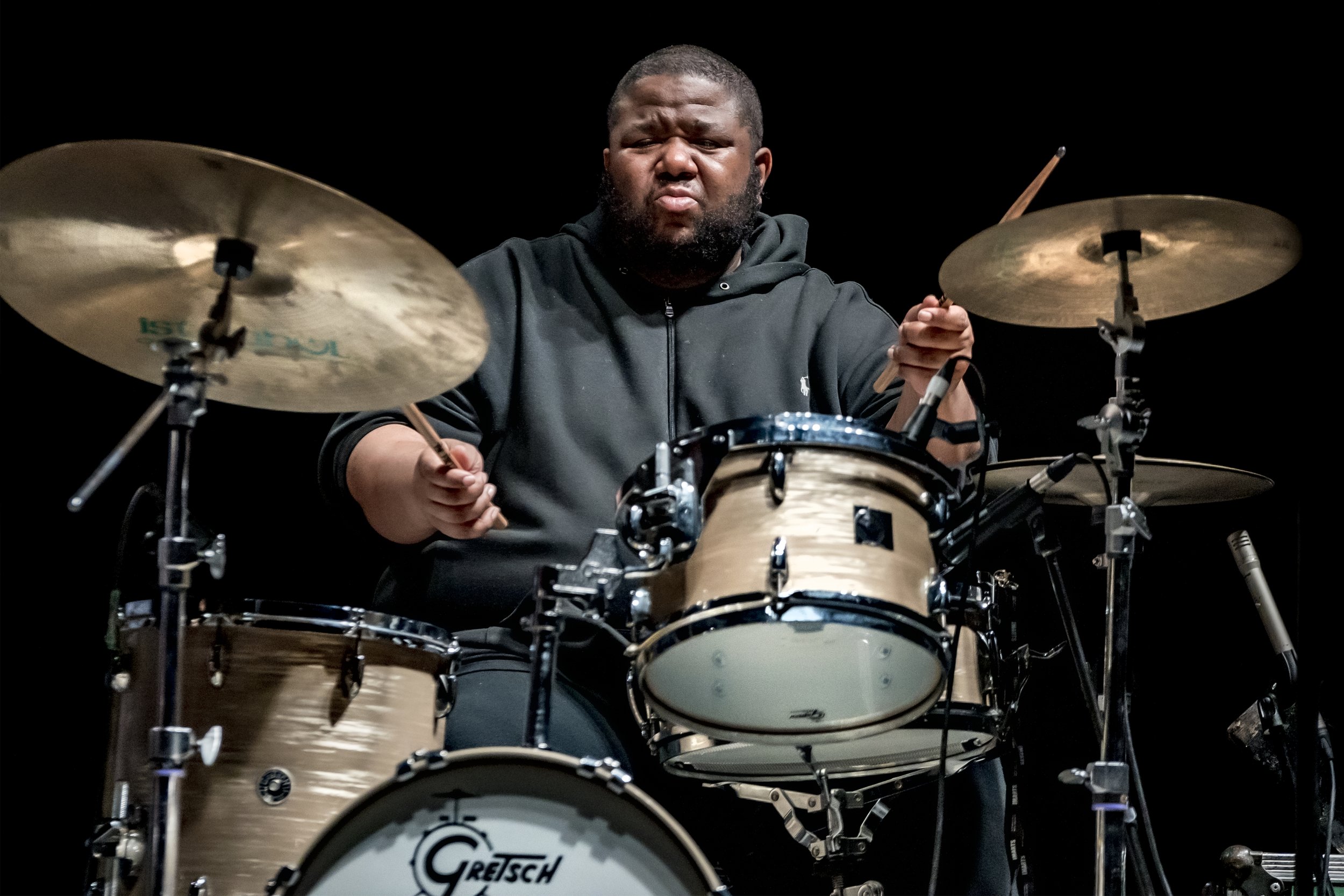‘Anti-concerto’ wins Pulitzer Prize for Music
OrchestrasTyshawn Sorey, who characterises himself as a ‘composer-musician who never had the makings of a varsity athlete’, has been awarded the 2024 Pulizter Prize for a piece called ‘Adagio’.
Co-commissioned by the Atlanta Symphony and the Lucerne Festival in Switzerland, Sorey describes the 20-minute score for saxophone and orchestra as an ‘anti-concerto’ that offers a ‘respite from the chaos and intrusiveness of modern life.’






He sure has the lingo down pat.
He seems like an interesting person. Quite avant garde.
Interesting or not, but avant garde? Hardly.
What modernist theory does to minds: it makes the victim inaccessible to music and creates a deep abyss between him/her and anything reminding of a musical tradition or musical training. All that is left, is sound, noise, and the emptiness of time passing, and this space is then filled-up with Concepts, about sound, time, space. No musical talent necessary. The most simplistic thing can now be dressed-up as a ‘work of art’ in a context where no measurements, judgements, standards are possible, and where everything is free, random interpretation. It is a truly democratic hobby (nothing is excluded or looked-down upon), open to everybody with some minimum of abilities to manipulate sound production on anything, including objects which in former periods were used as musical instruments.
https://www.youtube.com/watch?v=dv6tWCLh8cQ&list=RDEMWvKRTZKzyMkmfsjh2fKpow&start_radio=1
https://www.youtube.com/watch?v=o1OBindR5Q8
https://www.youtube.com/watch?v=w9xnHaxsorM
https://www.youtube.com/watch?v=dMh1MRBizv8&list=OLAK5uy_kKFbUwOXkH7CA-7wgqz6UVIpczs4-eh5Q
Morton Feldman did this so much better, because he had an ear for invention.
I don’t even read your rubbish anymore when it comes to posting about other composers. I just automatically downvote cause it’s the same garbage every time, John.
Sounds like you both rush to the same judgement.
Only JB provided examples; you just admitted to being petty.
I love this stuff! I tried it myself, at my lunch break, and yes it works! I never thought I had it in me. I used some half-filled glasses from the reception this morning, my coffe cup, an empty bottle of bleach, one of my pumps, and a little spoon as percussion instrument. It was a quite meditative experience, I felt being uplifted to some relaxing sphere of well-being, which I needed so desperately since I had such a short night!
Sally
I added a blow dryer and electric toothbrush followed by gargle
Anything, anything, as long as it breaks boundaries that form an obstacle to progress.
In the video, above, I thought the clarinet entered just a little early.
The perfect comment doesn’t exi…
Sorry, had to try a hip young meme.
DEI
So edgy! I bet it goes over great with the Breitbart/Stormfront/Daily Wire crowd.
Proof that skin has nothing to do with bad music. This is New Music class at any predominantly white university.
The Pulitzer Prizes have gone down the toilet. The NY Times got one for their anti-Semitic coverage of the war between Israel and Hamas. That says it all.
The Pulitzer prize became a total joke in music long before becoming a joke in “journalism.” After years of hoping to hear a great new piece, I have come to the conclusion I never will. I have stopped going to orchestra concerts that play crap [new music]. In that regard, YOUTUBE has become my friend. Consequently, I have switched from a subscriber to not gone in years. I am waiting for some reviewer to state the obvious: The New York Philharmonic’s Project 19 was an artistic disaster.
If new music is reported negatively, it will invite the reation of being reactionary. So, bad new music does not exist – how could we know? And listeners who find it crap, are simply labelled as conservative. This is the outcome of modernist ideology, a cloud’s cuckoo land of wishful thinking that has nothing to do with reality.
I’m struck by how old the finalist pieces this year are:
Kouyoumdjian: Paper Pianos (for amplified sinfonietta, audio playback, film and staging) — 2016 and still not finished
Lara: Double Concerto (for voice, flutes, double bass and orchestra) — 2019
Sorey: Adagio for Wadada Leo Smith (for alto saxophone and orchestra) — 2022
Goth’s comment below suggests how distant the awarders are from what was actually going on in music in the subject year. Sorey’s “For Ross Gay” and Lara’s “Breathing Blocks” are substantial works from 2023 that would presumably be on their radar. But it seems they are not properly looking.
So, the chair of the Pulitzer committee George E. Lewis (Chair), awards his former student a Pulitzer.
“During the six years of doctoral study that followed, Sorey worked closely with George E. Lewis.”
And – Lewis, who took over ICE as Artistic Director from founder Claire Chase, is chair of the P committee that reports that a piece Chase recorded is a Finalist.
Finalist: Double Concerto for esperanza spalding, Claire Chase, and large orchestra, by Felipe Lara.
Keep your friends close, and award them prizes.
Something that, as we all know, would never happen in the strictly meritocratic sphere of ‘traditional’ classical music, where, for instance, powerful and well-connected MDs never sweep in as external reviewers to anoint their protégées over better-qualified candidates.
Prizes are one big (or small) circle jerk. But there’s nothing new in all that, the old boys club has always existed since boys have existed, the cast changes in terms of race and gender, that’s all.
Substantively: if your explanation of your music is longer, more complicated, and more interesting than your music, there’s something wrong. But there again, there’s nothing new, composers whose music speaks for itself endure.
This is how the new music networks work, because the stuff is not rooted in any real audience commitment.
I think Tyshawn Sorey is a real musician and a real composer, whose work satisfies the Pulitzer guidelines for a “a distinguished musical composition.” But that idea of “distinguished” over the past decade seems to have changed, as evidenced by both winners and finalists. The old school of thinking was that “distinguished” meant Classical. Newer voices argue that Classical is only one small possibility of what could be “distinguished.” Unfortunately so much thinking around Classical music (a good deal of it not by performing musicians or working composers) is frought with social issues, so no one will ever be happy with what the Pulitzer jury says. Maybe it is time to let the prize go.
“Sorey is a real musician and a real composer”
but does he compose real music?
The way I see it, black musicians and composers go into white classical music because they can’t hack it in any black medium, be it jazz or pop or rap, it may sound racist, but that is also true of white musicians and composers: contemporary classical music has become the refuge of no rules, no standards, no need to account for audience, all disguised behind the façade of a pseudo/sterile/academic speak.
It’s pseudo music backed up by pseudo intellectualism.
The idea that Tyshawn Sorey couldn’t hack it in any black medium just doesn’t stand up to even the most cursory research. He is a phenomenal jazz drummer, has a huge reputation as a drummer in the jazz world, has played the Village Vanguard, toured extensively internationally as a drummer etc.
https://youtu.be/srdf7xK3xGo?si=iRZM4bd2K3SanJcZ
Did he win a Pulitzer for his drumming?
No, he won a Pulitzer for a white genre that has no standards.
People actually know what good drumming is, do you know what good contemporary classical music is? No one knows, and for that, he got the Pulitzer.
So I repeat, “contemporary classical music has become the refuge” for musicians to get rewards like a Pulitzer that they could not have gotten otherwise.
“The way I see it, black musicians and composers go into white classical music because they can’t hack it in any black medium”
Wow.
“it may sound racist”
It is.
“ The way I see it, black musicians and composers go into white classical music because they can’t hack it in any black medium…”
What the actual f#%@? I’d ask if you were serious but clearly, you are.
“…it may sound racist…”
It doesn’t sound racist; it is.
This is hilarious! What’s so brilliant about so many black composers is that they fully understand soo many musical languages, including those of the African diaspora (which is the proper way of referring to “Black” music, btw). They are polyglots. Tyshawn Sorrey is just that. You can’t hear that?!? All you have demonstrated in your comment is that your musical ear is truly, truly lacking. I actually chuckled out loud, that’s how amateur you sound and I bet you believe you’re an expert in music!
“They are polyglots”
Which is precisely my point, which all y’all purposely left out when quoting me, which is, he has mastered the “pseudo/sterile/academic speak…of pseudo intellectualism”, both in his composition and in his description of it.
(Btw, in your pseudo-intellectual circle you can call it African diaspora all you want, in mine, it’s Black. I don’t need to master your language.)
So that makes me “a person of the African diaspora”?
Thank you for clarifying that. Us black folk (sorry, us “people of the African diaspora”) are always getting stuff wrong.
It was originally meant for a musical composition that was fixed in some capacity — notated music, or tape (fixed media), not improvised. (There is nothing wrong with improvisation, it is just not a composition. They are two distinct ways a making a musical expression). Perhaps, something similar to science, where the results should be reproducible by others. As in, you have a score, others can play the composition. Or you have a recording of a fixed composition, such as Charles Wuorinen’s Time’s Encomium, and you play that. That piece lives on tape (fixed media). BTW the Wuorinen piece won the prize in 1970.
Here’s a complete performance. If you’re going to discuss the work, at least listen to it. https://youtu.be/dv6tWCLh8cQ?si=Tex52REDTjOsLbc6
I just listened again to all seven symphonies by Howard Hanson – all so beautiful, especially the first three. His Elegy for Serge Koussevitsky is also terrific. Why isn’t Hanson’s music more popular?
What an important question. Kudos.
I’ve been wondering that for years. No one can explain this.
all it took was one silly counterfeit $20.
He no original or substance both composer and drum kit jazz. He like Mr. Thomas on Supreme Court for New York and other big city publication and college music section who make choose. May be nice guy.
Never had the makings of a varsity athlete nor composer.
This piece is awkward, obvious, and simply boring.
But one accomplishment is that it makes Caroline Pshaw and Nico Mehly almost interesting by comparison.